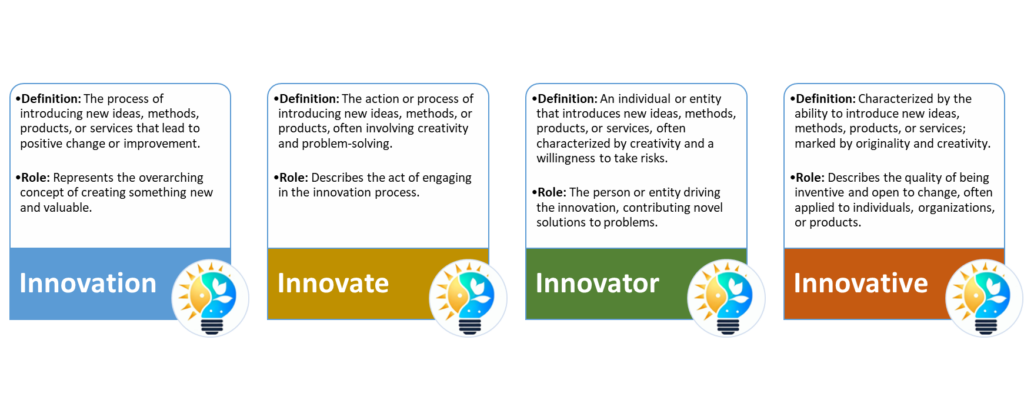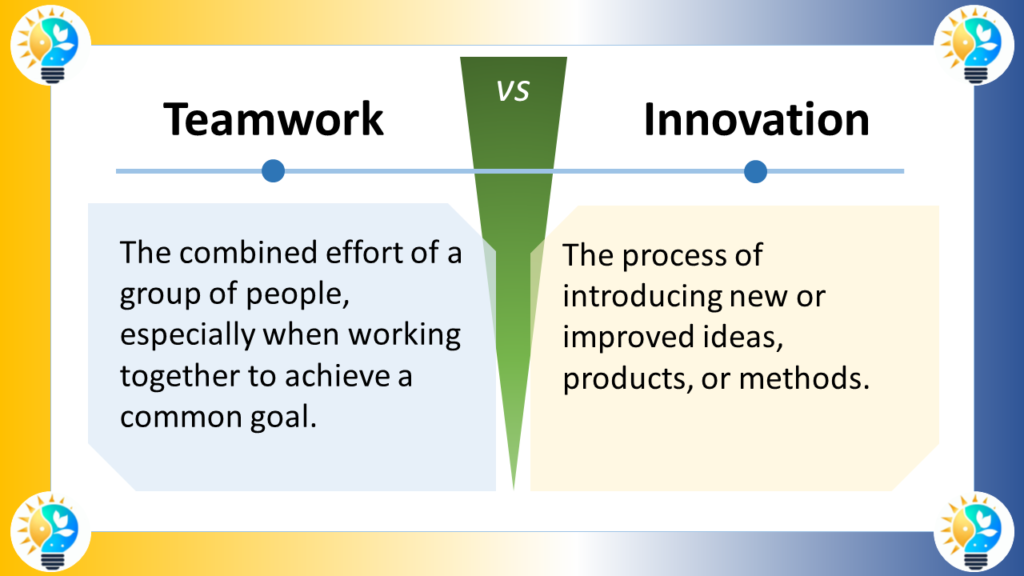A nuanced understanding of synonyms for innovation is indispensable for both professionals and businesses. This article delves into a range of terms that can seamlessly substitute for “innovation,” elucidating their core attributes and ramifications.

Innovation is considered as a driving force in progress.
It includes the introduction of novel ideas, methods, or products that bring positive change and advancement.
For more information about innovations, check our glossary
Defining Innovations Synonyms
Apprehending the array of synonyms for innovation transcends mere wordplay. Each term conveys distinct nuances and implications that can influence the approach of individuals and organizations towards the concept of innovation. These synonyms accentuate different facets of the innovation process, fostering new perspectives and strategies. Incorporating these synonyms into discourse facilitates conveying a more all-encompassing and intricate understanding of innovation.
To avoid redundancy and enhance clarity, let’s delve deeper into the definitions and examples of the synonyms associated with innovation:
- Creativity: Creativity embodies the generation of fresh concepts, ideas, or solutions. It forms the bedrock of innovation, as it serves as the genesis for converting ideas into tangible applications. For instance, the artistic world often thrives on creative innovation, where painters may experiment with novel techniques to create groundbreaking masterpieces.
- Ingenuity: Ingenuity denotes the capacity to think resourcefully and ingeniously, particularly in the realm of problem-solving. It underscores the resourcefulness and originality requisite for successful innovation. An example of ingenuity in innovation can be seen in the design of compact, multifunctional gadgets that address multiple user needs.
- Invention: Invention signifies the birth of something novel, whether it’s a product, procedure, or system. Innovations frequently emanate from revolutionary inventions that reshape entire industries. The invention of the smartphone, for instance, revolutionized communication and paved the way for various app-based innovations.
- Revolution: A revolution conveys a drastic or transformative change that ushers in new paradigms and breakthroughs. Game-changing innovations often stem from revolutionary ideas. The Green Revolution in agriculture, which introduced new farming techniques, is a prime example of how a transformative approach can lead to innovation.
- Progress: Progress denotes the steady advancement and enhancement of pre-existing processes or products. Gradual progress can eventually culminate in noteworthy innovations. The automotive industry’s transition from internal combustion engines to electric powertrains reflects progressive innovation responding to environmental concerns.
- Advancement: Advancement encompasses the development and refinement of concepts or technologies to augment their utility and functionality. Continuous advancement in medical imaging technology has led to innovations such as more precise diagnostic tools and minimally invasive surgical techniques.
- Breakthrough: A breakthrough signifies a momentous discovery or development that propels a field forward, ushering in novel possibilities and innovations. The discovery of penicillin, with its revolutionary impact on medicine, exemplifies a significant breakthrough that spurred various medical innovations.
- Modernization: Modernization entails updating and adapting established practices or technologies to align with contemporary demands and expectations. The modernization of urban infrastructure through the implementation of smart city technologies illustrates how innovation can improve daily living.
- Transformation: Transformation implies a comprehensive and profound alteration, often involving the integration of novel methodologies and technologies. The transformation of traditional retail into e-commerce platforms showcases how innovative technology can reshape entire industries.

Innovation in Professional Context
When integrating synonyms for innovation into a resume, applicants can spotlight their creativity, problem-solving prowess, and adaptability. Employers esteem candidates who exhibit ingenuity and the ability to spearhead advancements within their roles. The judicious utilization of these synonyms can heighten the resume’s appeal, increasing the likelihood of captivating the recruiter’s attention.
Synonyms for High-Level Innovation
To denote a substantial degree of innovation, individuals can employ terms like “cutting-edge,” “trailblazing,” “pioneering,” “groundbreaking,” or “forward-thinking.” These descriptors underscore a steadfast commitment to remaining at the vanguard of progress and acting as a catalyst for change.
What are the best Synonyms of Innovation For Business or Technology?
Differentiating Between Innovate, Innovative, and Innovation
It is crucial to distinguish between the terms “innovate,” “innovative,” and “innovation,” as they each encapsulate distinct aspects of the creative and transformative process.

Innovate: The verb “innovate” pertains to the action of introducing novel ideas, methods, or products into practice. It embodies the act of breaking new ground and driving change within established frameworks. Synonyms for “innovate” include “pioneer,” “initiate,” “devise,” and “create.” For instance, a company might innovate by developing a groundbreaking app that revolutionizes how people interact with their surroundings.
Innovative: The adjective “innovative” describes something characterized by its ability to generate new and inventive ideas, often resulting in a transformational impact. Synonyms for “innovative” encompass “original,” “imaginative,” “forward-thinking,” and “ingenious.” A design that incorporates sustainable materials and state-of-the-art technology can be deemed innovative, as it pioneers a fresh approach to sustainability and functionality.
Innovation: The noun “innovation” refers to the process or outcome of introducing new concepts, methods, or products that bring about significant positive change. It embodies the broader context of creativity and transformation. Synonyms for “innovation” include “revolution,” “advancement,” “breakthrough,” “modernization,” and “transformation.” An example of innovation could be the development of a self-driving car, which represents a groundbreaking transformation in the automotive industry’s landscape.
In essence, “innovate” emphasizes the action of introducing something new, “innovative” highlights the quality of generating inventive ideas, and “innovation” encompasses the overarching process and outcome of driving positive change through creative thinking.
Understanding the nuances between Innovation, Innovator, Innovate and Innovative
Synonyms for Driving Innovation
The process of driving innovation involves propelling forward the boundaries of creativity and progress. Several synonyms capture the essence of this dynamic endeavor, each emphasizing a unique facet of the transformative journey. To drive innovation is to “catalyze,” igniting change and growth through inventive ideas. It is also to “foster,” nurturing an environment where novel concepts flourish and evolve. “Championing” innovation involves taking a leadership role in advocating for fresh approaches and breakthroughs. Likewise, “orchestrating” innovation signifies skillfully coordinating various elements to harmonize and bring about groundbreaking outcomes. Furthermore, “propelling” innovation underscores the forceful momentum required to push beyond established norms. These synonyms collectively illustrate the multifaceted nature of driving innovation, encompassing the roles of leadership, guidance, and dynamic momentum in shaping the landscape of progress.
125 synonyms for innovation
To Note
- Innovation is multifaceted: Understanding the diverse synonyms of innovation can enrich our comprehension of its multifaceted nature.
- Adaptability is essential: Embracing various synonyms can enhance communication and adaptability in different professional settings.
- Highlighting creativity and problem-solving: Synonyms like “creativity” and “ingenuity” emphasize the importance of these qualities in driving innovation.
- Impacting career prospects: Incorporating innovation synonyms in resumes can positively impact job applications.
References:
- Wikipedia. “Innovation.” Link
- Eurostat. “Glossary: Innovation.” Link
- Unraveling New Innovations: Pioneering Technologies Reshaping the World
- Innovation Defined: Exploring the Essence of Creative Progress


